Publikace, nahrávky a jiné výstupy
Přehled toho, co jsem napsal a zveřejnil (jako sociolog) nebo nahrál a vydal (jako muzikant). Prostě veřejně dostupné "výstupy". V případě, že je to právně a technicky možné, postupně sem dávám k dispozici i plné texty a do příslušných oddílů hudební sekce pak i nějaké hudební ukázky ve formátu mp3.

RICHTER, P. (2003): Richtig music. 2CD. Indies Records [MAM-202]
::::"Dvoudiskový profil legendy české altenativní hudby, kytaristy, zpěváka a skladatele Pavla Richtera, mapuje celou jeho muzikantskou kariéru a obsahuje 23 nahrávek z let 1976-2003, přičemž při sestavování byl kladen důraz na zatím nikdy nezveřejněné nahrávky. Nejstarším záznamem je ukázka tvorby Elektrobusu, následují ukázky různých sestav skupiny Švehlík, resp. Marno Union (dvě koncertní nahrávky z roku 1978, dva domácí snímky z roku 1982, jedna skladba z alba obnoveného Švehlíku z roku 1995). Z poloviny 80. let pocházejí nahrávky s Oldřichem Janotou a sólová experimentální tvorba z Richterova domácího studia. První disk končí dvěma nahrávkami Richter Bandu z roku 1990 a jednou písní z dosud nepublikovaného záznamu obnovené sestavy Janota-Fidler-Richter z roku 1995. Mezi zúčastněnými hudebníky najdeme například Mikoláše Chadimu, Vlastimila Marka, Luboše Fidlera, Lesika Hajdovského, Ivana Pavlů, Zdeňka Konopáska či Jaroslava Kořána. Druhý disk zahrnuje odbdobí od roku 1996 a přináší ukázky z tvorby skupin Santus Musicus, Richter Band, Guru Band, Wooden Toys a nejnovější sólovou tvorbu Pavla Richtera. Mezi zúčasněnými hudebníky najdeme Bharatu Rajnoška, Janu Koubkovou či Antonína Hlávku. Z celkových 23 nahrávek je 18 publikováno poprvé, píseň V bílém (z alba Iva Bittová + Dunaj) dosud vyšla jen na gramofonové desce." (Indies)
[hudební ukázky zde]
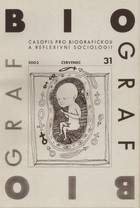
MOL, A. / LAW, J. (2003): Vtělené jednání, zjednávaná těla: příklad hypoglykémie. Biograf , (31): 5-25
, (31): 5-25
::::We all know that we have and are our bodies. But might it be possible to leave this common place? In the present article we try to do this by attending to the way we do our bodies. The site where we look for such action is that of handling the hypoglycaemias that sometimes happen to people with diabetes. In this site it appears that the body, active in measuring, feeling and countering hypoglycaemias is not a bounded whole: its boundaries leak. Bits and pieces of the outside get incorporated within the active body; while the centre of some bodily activities is beyond the skin. The body thus enacted is not self-evidently coherent either. There are tensions between the body's organs; between the control under which we put our bodies and the erratic character of their behaviour; and between the various needs and desires single bodies somehow try to combine. Thus to say that a body is a whole, or so we conclude, skips over a lot of work. One does not hang together as a matter of course: keeping oneself together is something the embodied person needs to do. The person who fails to do so dies.
MOL, A. / LAW, J. (2004): Embodied action, enacted bodies: The example of hypoglycaemia. Body & Society, 10 (2-3): 43-62
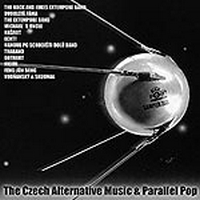
V/A (2002): Black Point sampler 2001. CD. Black Point [BP01322]
[BP01322]
::::"... Ucelený přehled o loňské produkci vydavatelství přináší Black Point Sampler 2001. Reprezentativní výběr zachycuje čtrnáct skladeb kapel a interpretů, kteří se v loňském roce dočkali samostatného alba. Výběr je to skutečně pestrý a hudba kvalitní. Vedle archivních záznamů alternativních skupin 80. let (Dvouletá fáma, The Extempore Band, Michael´s Uncle) nabízí etnickou a world music (Gothart, Nigun, Feng-Jun Song), pubrockový Echt!, bigbítové Schodiště, hořkosladké popěvky dvojice Vodňanský Skoumal či říznou kramářskou dechovku v podání Trabandu. Vše v nejvyšší kvalitě a originálním pojetí. Sampler dokazuje, že loňský rok se Black Pointu vydařil a alba Echt!u, Schodiště, Trabandu, Extempore, Nigunu či Gothartu patří k ozdobám hudebního trhu." (Karel Souček)
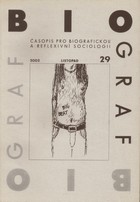
LATOUR, B. (2002): Když věci vracejí úder: Co mohou sociálním vědám přinést "vědní studia". Biograf , (29): 3-20 - přeložil Zdeněk Konopásek
, (29): 3-20 - přeložil Zdeněk Konopásek
::::The contribution of the field of science and technology studies (STS) to mainstream sociology has so far been slim because of a misunderstanding about what it means to provide a social explanation of a piece of science or of an artefact. The type of explanation possible for religion, art or popular culture no longer works in the case of hard science or technology. This does not mean, it is argued, that science and technology escapes sociological explanation, but that a deep redescription of what is a social explanation is in order. Once this misunderstanding has been clarified, it becomes interesting to measure up the challenge raised by STS to the usual epistemologies social sciences believed necessary for their undertakings. The social sciences imitate the natural sciences in a way that render them unable to profit from the type of objectivity found in the natural sciences. It is argued that by following the STS lead, social sciences may start to imitate the natural sciences in a very different fashion. Once the meanings of "social" and of "science" are reconfigured, the definition of what a "social science" is and what it can do in the political arena is considered. Again it is not by imitating the philosophers of science's ideas of what is a natural science that sociology can be made politically relevant.
LATOUR, B. (2000): When things strike back: A possible contribution of "science studies" to the social sciences. The British Journal of Sociology, 51 (1): 107-123
KONOPÁSEK, Z. / KUSÁ, Z. / STOCKELOVÁ, T. / VAJDOVÁ, Z. / ZAMYKALOVÁ (2002): Czech Republic - a national profile. Research report of the Public Accountability European Research Project, CT2001-00076. Praha. Dostupné na adrese http://zdenek.konopasek.net/docs/WP1_Czech.pdf
::::
KONOPÁSEK, Z. (2002): Dejme smysl volební neúčasti. MF Dnes. 7. června, str. A/9. Rukopis dostupný na adrese http://zdenek.konopasek.net/archiv/texty/neucast.htm
::::
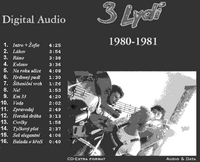
3 Lydi (2001): 3 Lydi 1980-1981. CD. Vydáno vlasntím nákladem Milana Voříška
::::Domácí nahrávky pořízené na kazetový magnetofon, shrnující "vrcholnou" podobu téhle kapely z jara 1981.
[hudební ukázky zde]

V/A (2001): Black Point totality sampler. CD. Black Point [BP 0128-2]
[BP 0128-2]
::::"Zcela ojedinělá kompilace songů, které vznikaly v Čechách a na Moravě v dobách tuhé normalizace. Přestože z většiny skladeb dýchá dusná a temná atmosféra oněch dob, lze z většiny slyšet také vzdor a vůli po svobodě vyjádření, která byla tehdejším komunistickým pohlavárům nejvíce proti srsti." (Black Point)
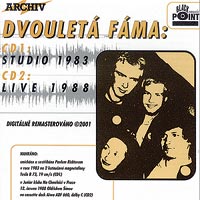
DVOULETÁ FÁMA (2001): Studio 1983/Live 1988 (2CD). Black Point [BP-0012-2]
[BP-0012-2]
::::"Toto dvojcédéčko zahrnuje jednak vlastním nákladem vydanou studiovou nahrávku z roku 1983, jediné album Dvouleté fámy, a jednak dvě živé nahrávky z roku 1988. Kapely, které se na těchto dvou discích představují, jsou dost odlišné a není vlastně moc na místě, když nesou stejné jméno. V roce 1983 byla Dvouletá fáma čtveřicí muzikantů ve složení Zdeněk Konopásek (bicí), Martin Vik (kytara), Jana Machácková (zpěv) a Ivan Benda (baskytara). Kapela hrála složitě vystavěné novovlnné písničky, které lze řadit někam mezi Talking Heads, Pere Ubu a Art Bears. Studiová nahrávka z roku 1983 hýři vtipem a půvabem. Vikova drnkavá a jakoby rozladěná kytara skvěle pasuje na hravé zpívání Macháčkové (které někomu může připomínat Haco z After Dinner). Živé nahrávky z roku 1988 představují už něco docela jiného - náročnějšího, ale stále velmi pozoruhodného. Z původní sestavy zůstali pouze Konopásek s Vikem. Na prvních 14 stopách (nahraných 12. června 1988) hrají v triu spolu s básníkem a hercem Radomilem Uhlířem. Posledních šest písní (datum není přesně určeno, ale jde patrně o nahrávky několik měsíců pozdější) vystupuje s kapelou ještě basista Josef Ferda Matousek. Tyto písně nás zavádějí do mnohem temnějších světů, je v nich hodně improvizace a vévodí jim Uhlířova divadelní (a často absurdní) deklamace. Zatímco ti, kdo nemluví česky, si jistě skrznaskrz užijí první disk, je zcela jasné, že na druhém disku jim nutně uniká podstatný rozměr. I tam jsou ale pozoruhodné pasáže. Celkovou náladou připomíná MCH Band Mikoláše Chadimy. Nahrávky byly pro toto vydání skvěle remastrovány, takže Studio 1983 & Live 1988 patří k tomu nejpozoruhodnějšímu, co v archivní edici Black Pointu kdy vyšlo."
François Couture, All-Music Guide [hudební ukázky zde]
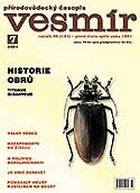
LATOUR, B. (2001): Nepřehlédněme žížalu Pontoscoles corethrurus. Vesmír, 80 (7): 383-85 - přeložili Zdeněk Konopásek a David Storch
::::Překlad článku: LATOUR, B. (nedat.): Let’s us not overlook the earthworm Pontoscolex corethrurus. Rukopis, dostupné na adrese http://bruno.latour.fr










